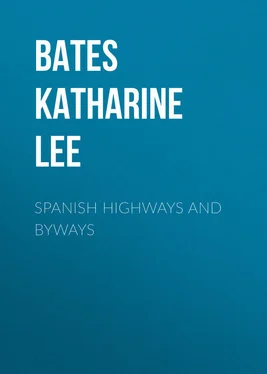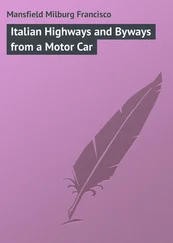Katharine Bates - Spanish Highways and Byways
Здесь есть возможность читать онлайн «Katharine Bates - Spanish Highways and Byways» — ознакомительный отрывок электронной книги совершенно бесплатно, а после прочтения отрывка купить полную версию. В некоторых случаях можно слушать аудио, скачать через торрент в формате fb2 и присутствует краткое содержание. ISBN: , Жанр: foreign_antique, foreign_prose, Путешествия и география, на английском языке. Описание произведения, (предисловие) а так же отзывы посетителей доступны на портале библиотеки ЛибКат.
- Название:Spanish Highways and Byways
- Автор:
- Жанр:
- Год:неизвестен
- ISBN:http://www.gutenberg.org/ebooks/38767
- Рейтинг книги:5 / 5. Голосов: 1
-
Избранное:Добавить в избранное
- Отзывы:
-
Ваша оценка:
- 100
- 1
- 2
- 3
- 4
- 5
Spanish Highways and Byways: краткое содержание, описание и аннотация
Предлагаем к чтению аннотацию, описание, краткое содержание или предисловие (зависит от того, что написал сам автор книги «Spanish Highways and Byways»). Если вы не нашли необходимую информацию о книге — напишите в комментариях, мы постараемся отыскать её.
Spanish Highways and Byways — читать онлайн ознакомительный отрывок
Ниже представлен текст книги, разбитый по страницам. Система сохранения места последней прочитанной страницы, позволяет с удобством читать онлайн бесплатно книгу «Spanish Highways and Byways», без необходимости каждый раз заново искать на чём Вы остановились. Поставьте закладку, и сможете в любой момент перейти на страницу, на которой закончили чтение.
Интервал:
Закладка:
Among the new tales of Spanish valor told us on the Alhambra hill was this: —
When lots were drawn for military service, one blithe young scapegrace found in his hand a fortunate high number, but, walking away in fine feather over his luck, he met the mother of a friend of his, sobbing wildly as she went. Her son had been drafted, and the two hundred dollars of redemption money was as far beyond her reach as those dazzling crests of the Sierra Nevada are above the lame beggar at the Alhambra gate. Then the kindly fellow, troubled by her grief and mindful of the fact that, orphan as he was, his own parting would be at no such cost of tears, offered to serve in her boy's stead. Her passion of gratitude could not let his service go all unrecompensed. Poorest of the poor, she went about among her humble friends, lauding his deed, until she had collected, peseta by peseta , the sum of sixteen dollars, which she thrust into his hands to buy comforts for the campaign. But another sobbing mother sought him out. He had saved her neighbor's son; would he not save hers? Laughing at her logic and moved by her faith in him, he answered: "I am only one man, señora. I cannot go in place of two. But here are sixteen dollars. If you can find a substitute at such a price, the money is yours."
Sixteen dollars is a fortune to hunger and nakedness, and the substitute was found. As the year wore on those two mothers did not let the city forget its light-hearted hero, and a great assembly gathered at the station to honor his return. A remnant of his comrades descended from the train, but as for him, they said, he had died in Cuba of the fever months before.
His was no poetic death like that of the Abencerrages. Happy Abencerrages! They knew the Alhambra in the freshness of her beauty. Their last uplifted glances looked upon the most exquisite ceilings in the world. Their blood left immortal stains on the marble base of the fountain. But this young Spaniard, in his obscure Cuban grave, only one out of the eighty thousand, will promptly be forgotten. No importa. There must be something better than glory for the man who does more than his duty.
IV
A FUNCTION IN GRANADA
"O Love Divine, Celestial Purity,
Pity my cries!
My soul is prone before a clouded throne.
Let thy keen light arise,
Pierce this obscurity
And free my dream-bound eyes!"
The civilization of Spain, streaked as it is with Oriental barbarisms, belated and discouraged as the end of the nineteenth century finds it, is still in many respects finer than our own. In everything that relates to grace and charm of social intercourse, to the dignified expression of reverence, compassion, and acknowledgment, Spain puts us to the blush. I was especially touched in Granada by the whole-souled sympathy and veneration with which the city rendered public honors to one of its sons, Angel Ganivet, who died in the preceding winter, a poet hardly thirty.
Although I had glanced over obituary notices of this Spanish writer in the Paris papers, I had but a vague idea of his work and life, and sought, before the night of the memorial ceremonies, for further information. I appealed, first of all, to our table waiter, whose keen black eyes instantly turned sad and tender.
" Pobre! Pobre! He threw himself into the river at Riga, in Russia, where he was consul. It was at the close of the war. And he such a genius! So young! So true a Spaniard! But all Granada will be at the theatre. He left his play to Granada, asking that it be seen here first of all. I have never read his books, but I have met him in the streets, and lifted my hat to him for a wise caballero who cared greatly for Spain."
My next appeal was to our kind neighbor, the English consul, who assured me laughingly that he, like myself, was vainly ransacking the few bookstores of Granada for Ganivet's works.
"The first time I ever heard the name," he added, "was some three or four years ago, when I noticed an old gentleman standing often in front of my house, and gazing at the British coat-of-arms above my door. He told me one day when I drew him into talk that he had a nephew, Angel Ganivet, roaming in foreign lands. 'But he does not forget his old uncle,' said he. 'I always receive my little pension prompt to the day, and so I like to look at the foreign shields about the city, and remember my nephew, far away, who remembers me.' That was a trifle, of course, but it gave me a kindly feeling for the young fellow, and I'm sorry he came to such an end. They found him in the river, you know. I dare say it was suicide, and likely enough the defeat of Spain had its share in causing his despondency; but nobody knows. He was a zealous patriot, I understand, and all Granada seems to take his death to heart."
My next authority was an aged Granadine, a man of letters; but he had not read Ganivet's books.
"I have heard of him often," he said, "but I never met him. He was not much in Granada, although he seems to have had a romantic affection for the place. Bueno! Its pomegranates are worth remembering. But Ganivet liked to live in foreign countries, with the idea of understanding his own better by comparison. He was young; he still had hopes for Spain. Eighty years are on my head, and I have long done with hoping. I have served in my country's armies, I have served in her Government, I have seen much of Church and State, and since the night when they murdered General Prim I have seen nothing good. But Ganivet had faith in the national future, and the people, without waiting to ask on what that faith was founded, love him for it, and mourn his loss as if he had been their benefactor. They are all going to pour into the theatre to-morrow night to hear his symbolic drama, that not one in a hundred of them will try to understand, and the hundredth will get it all wrong."
The "function" took place in the Gran Teatro de Isabel la Católica , a name to conjure with throughout all Spain, and especially in Granada. The day set for the performance, and widely advertised by newspapers and posters for a month in advance, was a Wednesday. On Tuesday, in a fever lest we be too late, we arrived at the ticket office. We had our hurry all to ourselves. Apparently nobody else had as yet taken a seat. The office was empty, save for us and our attendant train of boys and beggars.
The official in charge, deaf, slow, and courteous, invited us into a private room and gave us rocking-chairs by the brasero , while he, with paper and pencil, laboriously added the price of our entradas to the price of our modest box, and spent five minutes in subtracting the amount from the figure of the small bill we handed him. The counting out of the change was another strain on his arithmetic, and, after all these toils, we were still without tickets. He said he would "write them out at home," and we might send some one for them the next day. But he affably offered to show us the theatre, and led us through black passages to a great dusky space, where, while he struck match after match, we could catch glimpses of pit and balconies, and even a far-off stage, with a group of actors gathered about a lamp, rehearsing the play. In Wednesday morning's paper, however, they announced with entire nonchalance that they were not ready yet, and would postpone the representation until Thursday.
On Thursday evening the theatre, choking full though it was, hardly presented a brilliant appearance. Granada is not Madrid, nor Seville, and the best the Granadines had to offer their dead poet was the tribute of their presence in such guise as they could command. The big, barnlike theatre, with its rows of broken lamp-chimneys, looked shabby, and the rag-tag proportion of the audience was so great that it overflowed the Paraiso into the aisles and doorways and all conceivable corners. People were so jumbled and crumpled together that, with reminiscences of my traveller's hold-all, I found myself wondering if they would ever shake out smooth again.
Читать дальшеИнтервал:
Закладка:
Похожие книги на «Spanish Highways and Byways»
Представляем Вашему вниманию похожие книги на «Spanish Highways and Byways» списком для выбора. Мы отобрали схожую по названию и смыслу литературу в надежде предоставить читателям больше вариантов отыскать новые, интересные, ещё непрочитанные произведения.
Обсуждение, отзывы о книге «Spanish Highways and Byways» и просто собственные мнения читателей. Оставьте ваши комментарии, напишите, что Вы думаете о произведении, его смысле или главных героях. Укажите что конкретно понравилось, а что нет, и почему Вы так считаете.












